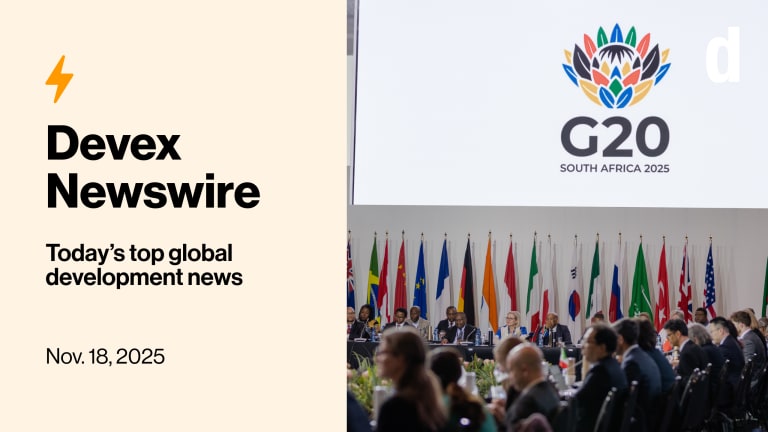
Aspen Pharmacare is planning to boost its manufacturing capacity for Johnson & Johnson’s COVID-19 vaccine in South Africa by 200 million doses annually starting in January, according to Strive Masiyiwa, a special envoy for the African Union. This is on top of existing capacity to produce 300 million vaccine doses per year.
“Increase our capacity, and ... do it from Africa,” Masiyiwa said in a call with reporters Thursday. “The only thing we can rely on is what is happening on our continent.”
Sign up for Devex CheckUp
The must-read weekly newsletter for exclusive global health news and insider insights.
The AU is sourcing its order of 400 million doses of the J&J vaccine through Aspen, to be delivered over the next year. Shipments began arriving in African countries on Thursday. Nations are expected to receive 6.4 million of these doses this month, accelerating to 10 million in September. This is expected to ramp up to 31 million doses per month in January, as production capacities increase in South Africa, Masiyiwa said.
Only 1.7% of the continent’s population is fully vaccinated against COVID-19, and these much-needed vaccines come as Africa is experiencing a peak in weekly deaths from the disease since the beginning of the pandemic.
Following Masiyiwa’s announcement about the increase in manufacturing capacity, a spokesperson said Aspen is "not in a position to provide any comment around this as no formal announcements in this regard has been made” by the company.
Aspen is involved in the “fill and finish” portion of vaccine production, meaning it fills vials with vaccine from a plant in Europe and then ships them.
The International Finance Corporation, German development finance institution DEG, French DFI Proparco, and the U.S. International Development Finance Corporation announced €600 million in financing for Aspen at the end of June, aiming to support its vaccine production and strengthen the company.
Also, vaccine shipments to Africa from the international COVAX initiative have begun to increase. Almost 12 million doses arrived from the initiative in July — more than the total received across the continent from April to June.
African countries, which have been heavily dependent on doses from COVAX, were left with limited access to vaccines over the past few months after the initiative was cut off from supplies from India, which restricted the export of doses to manage its own COVID-19 crisis domestically. COVAX had been reliant on doses produced by the Serum Institute of India.
In January, COVAX told the AU that Africa could expect to receive 255 million doses from the initiative by the end of July, according to Masiyiwa. But he said the World Health Organization informed the AU during a meeting Wednesday that fewer than 30 million doses had been delivered to African nations — around 10% of what was anticipated.
“This is where the crisis is for us. This [expected delivery] has not happened,” Masiyiwa said.
AU officials do not believe that South Africa will ban the export of doses to other countries on the continent, as South African President Cyril Ramaphosa is leading the African Vaccine Acquisition Trust — the AU entity that entered into the agreement to purchase doses from J&J, Masiyiwa said.
“He cannot turn around and suddenly now say, ‘No, no, no, you can't ship my vaccines out,’” Masiyiwa said.
He added that COVAX’s dependency on India was unrealistic. The population of India is 1.4 billion, which is about the same as the population of Africa as a whole. South Africa only has about 60 million people.
“The only thing we can rely on is what is happening on our continent.”
— Strive Masiyiwa, African Union special envoy“To have expected that [India] would meet their needs, plus our own needs, was pretty naive,” Masiyiwa said.
The AU’s deal for 400 million doses included 220 million to start, with the option for the continent to purchase an additional 180 million. During a “historic” meeting last week, Masiyiwa said the World Bank agreed to pay for all the doses for any member states that are not paying on their own, allowing the 180 million order to move forward.
Masiyiwa said the AU will “probably announce another deal in the next couple of weeks” from a different supplier for more doses.
The AU aims to have about 30% of the continent’s population vaccinated by the end of this year. But it will need 250 million more doses than the number outlined in the COVAX and AU agreement to meet this goal, said Dr. Phionah Atuhebwe, new vaccines introduction officer for WHO’s Regional Office for Africa, during a press briefing Thursday.









